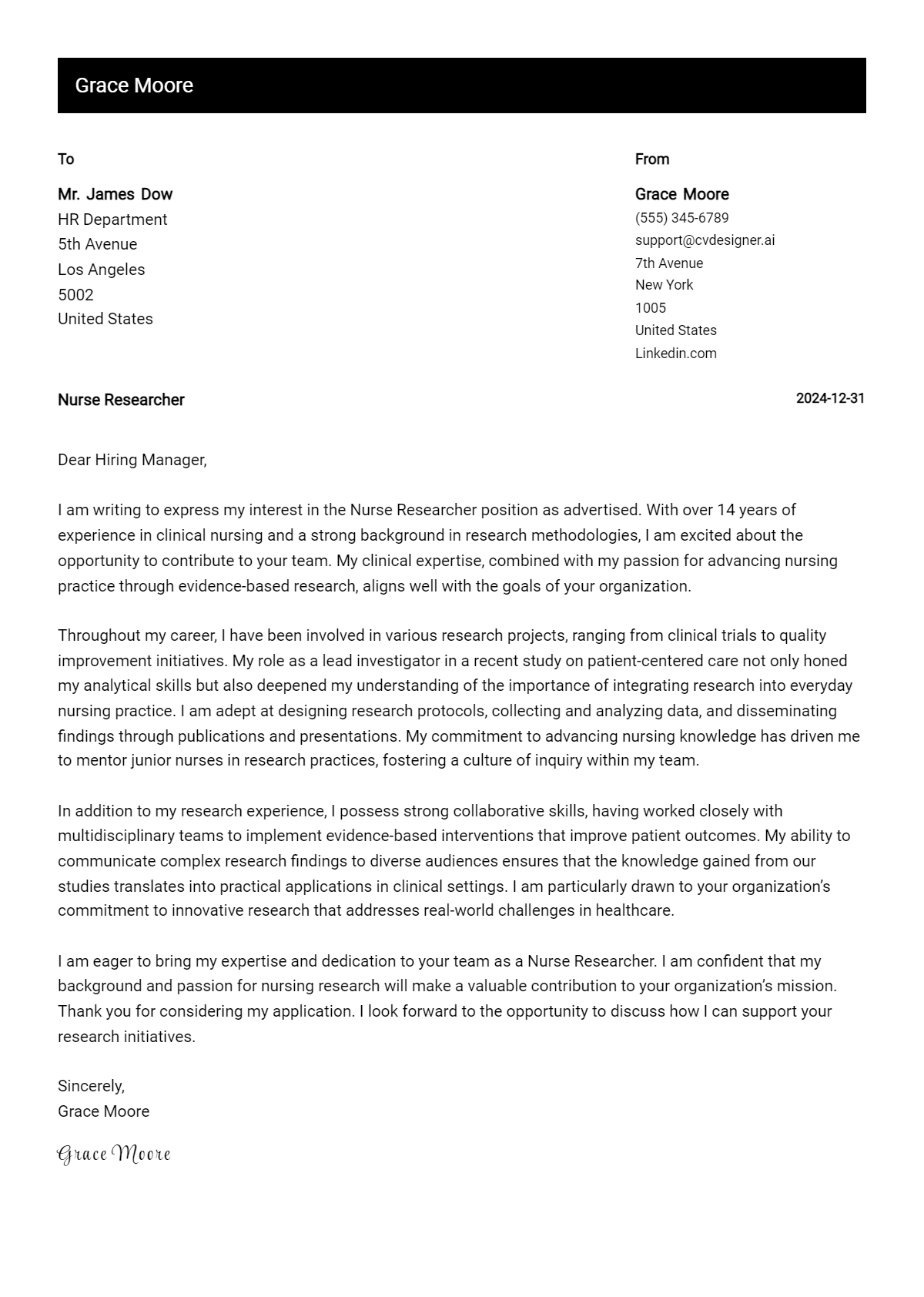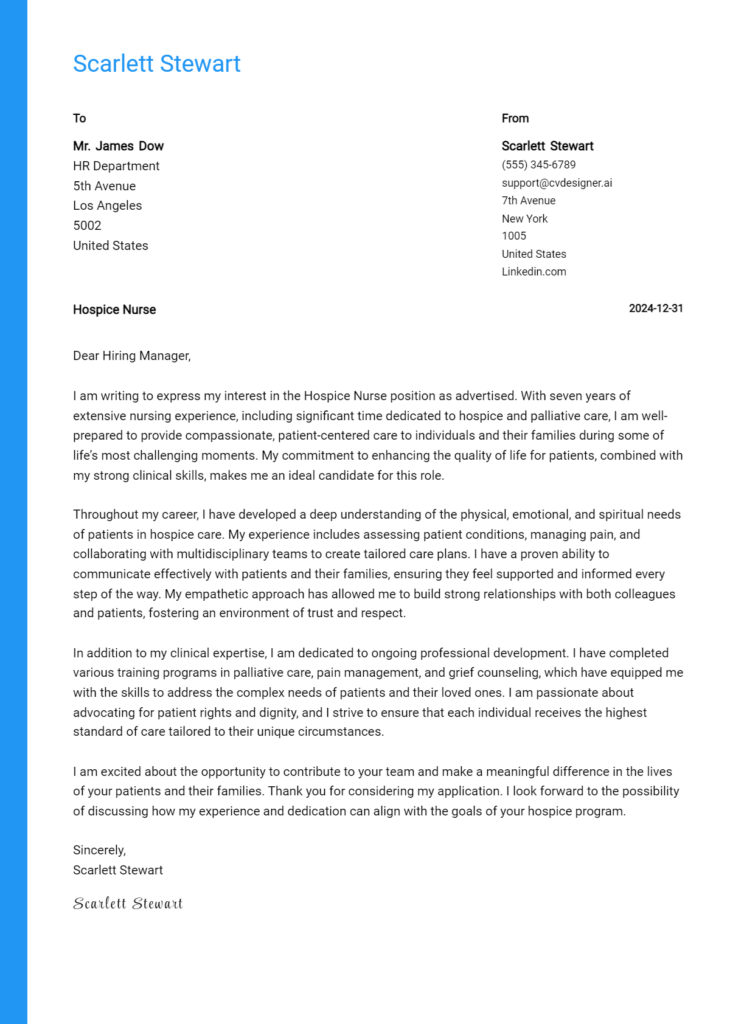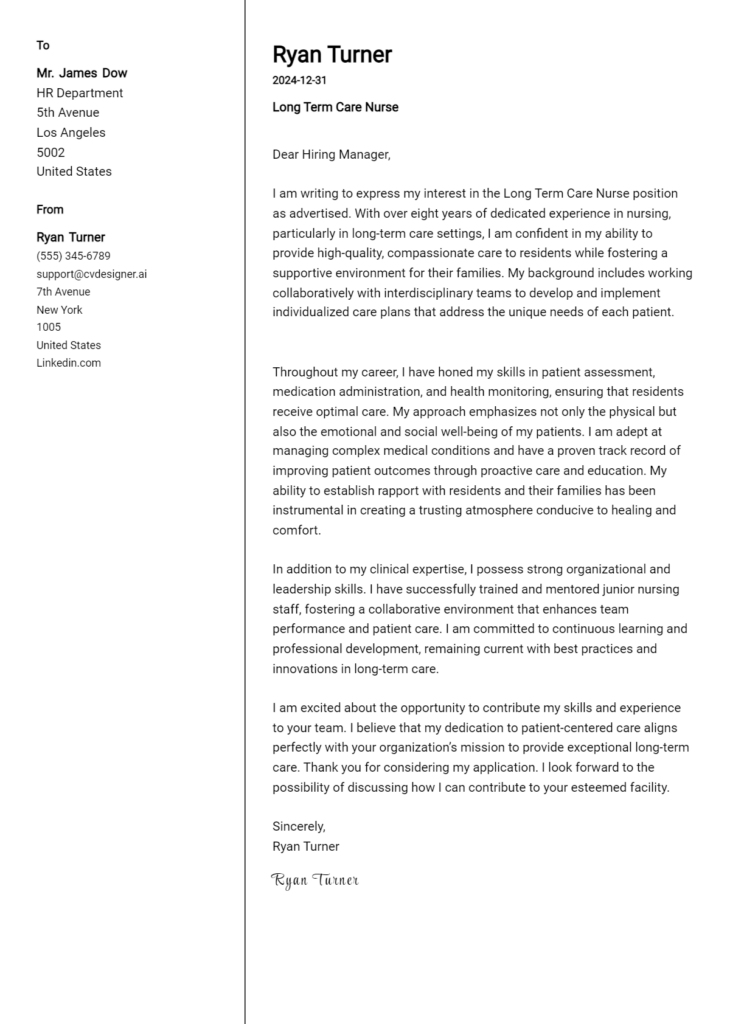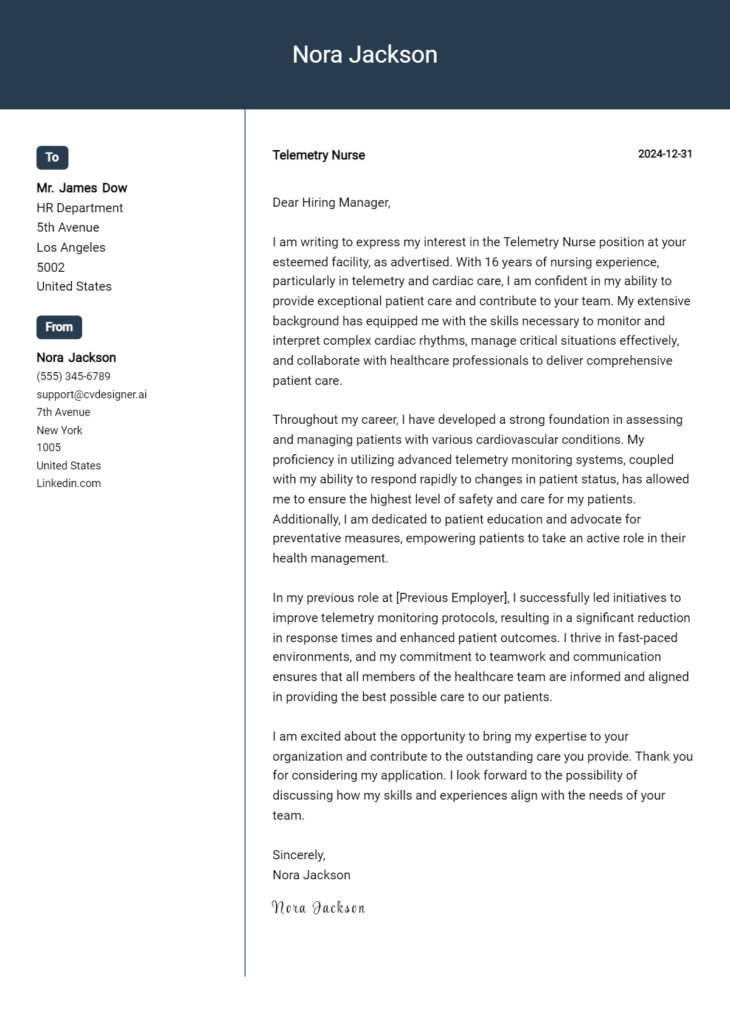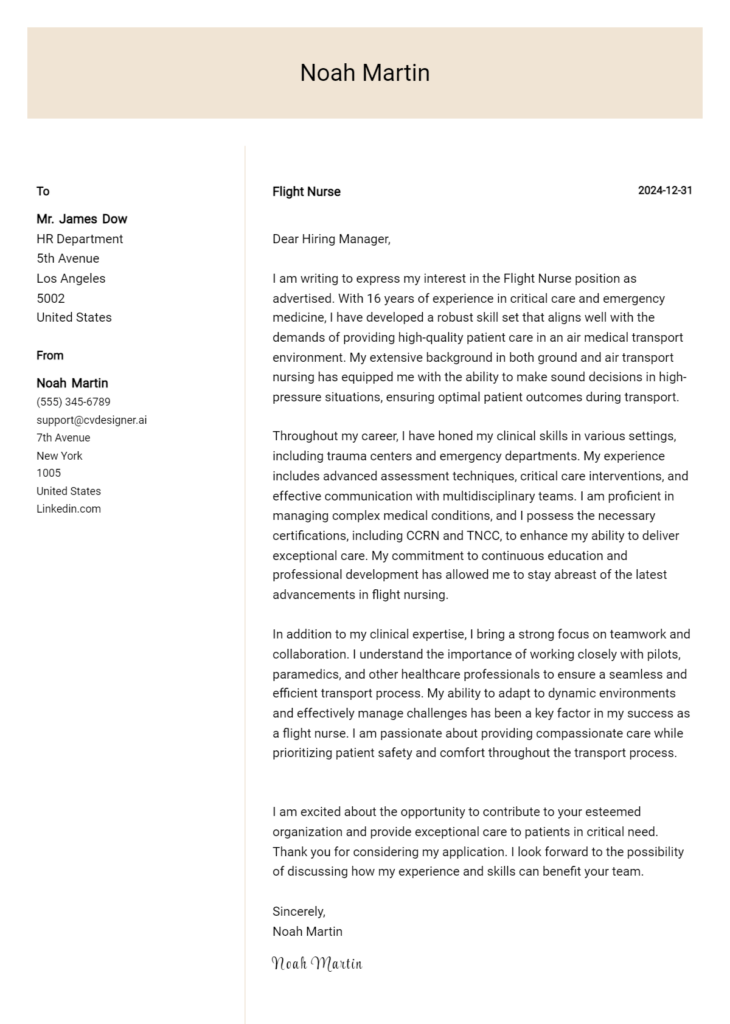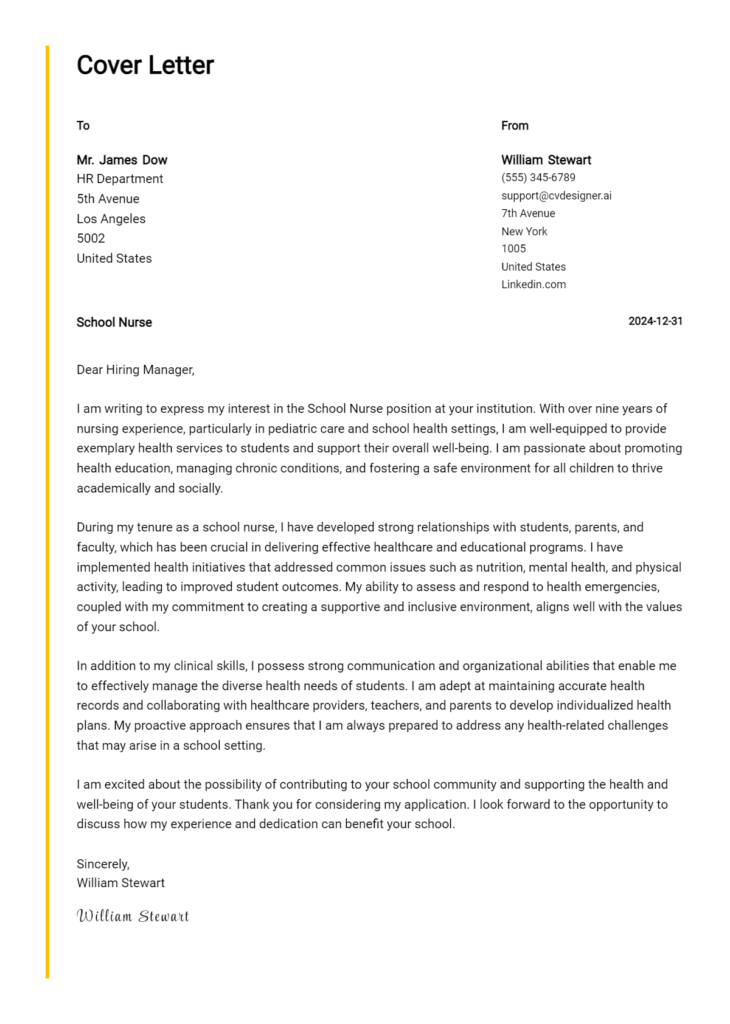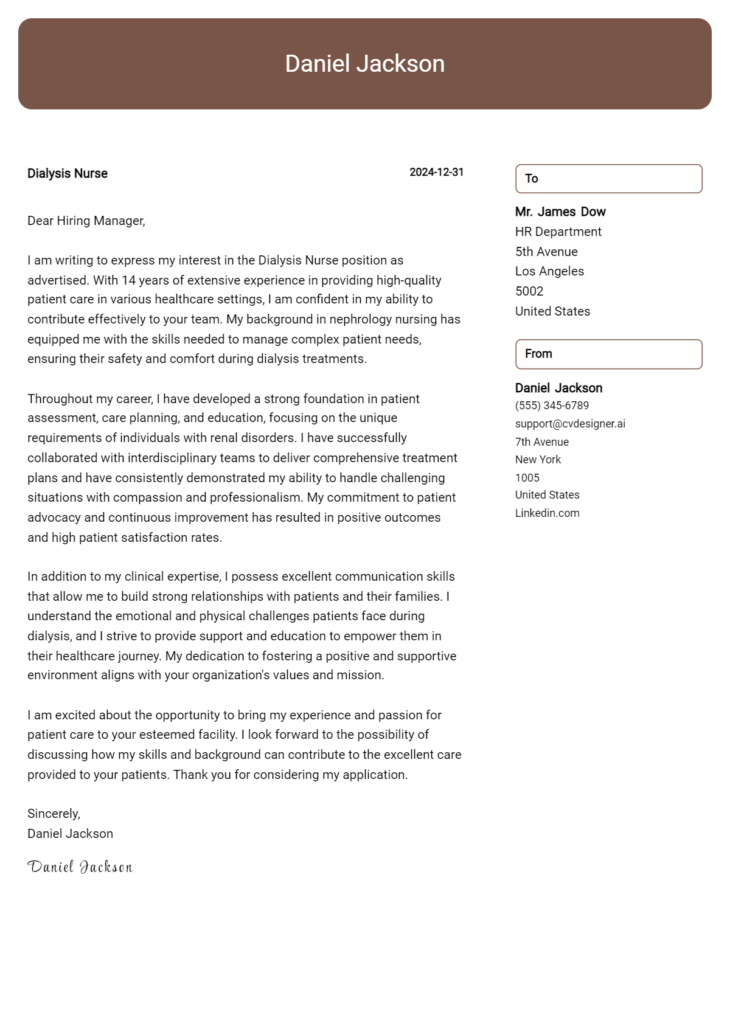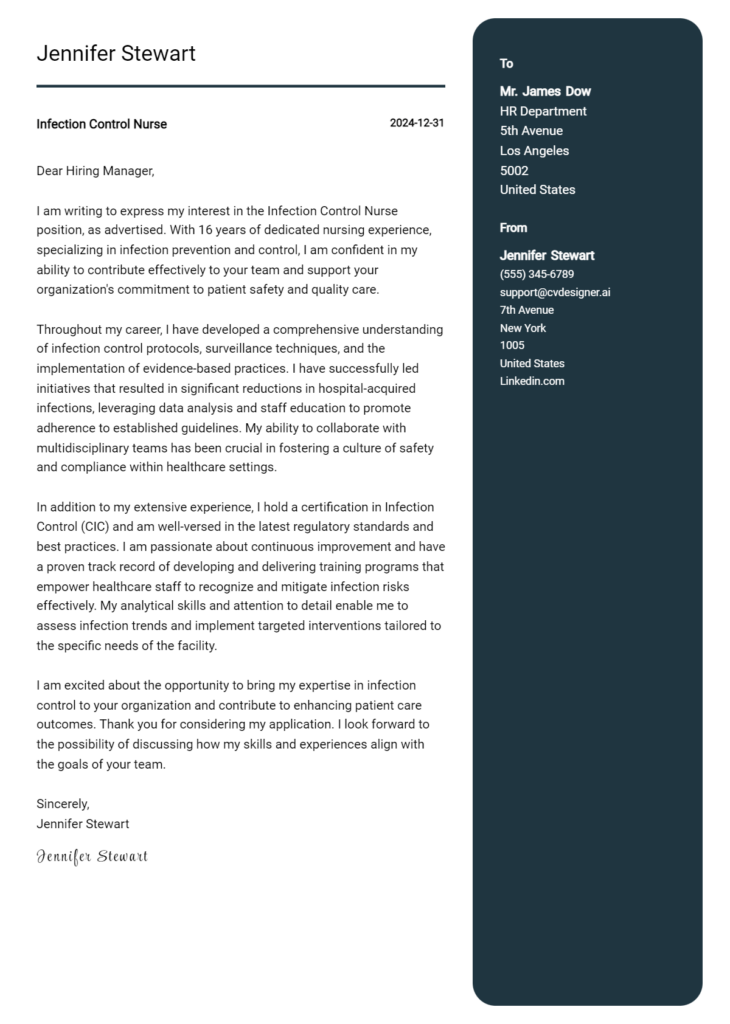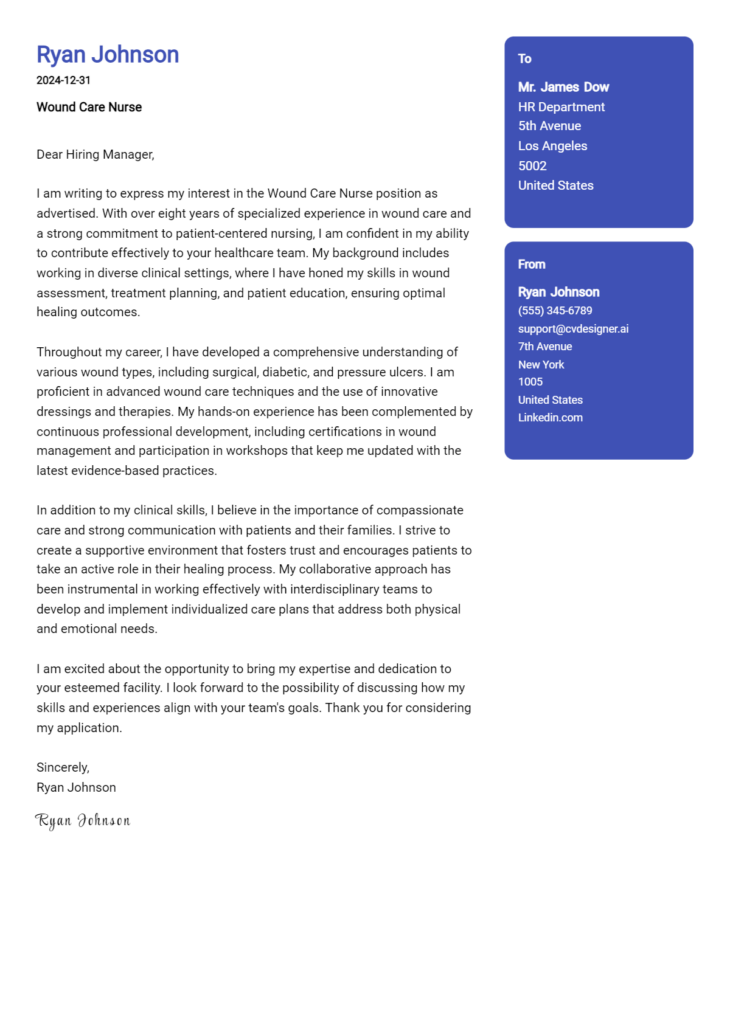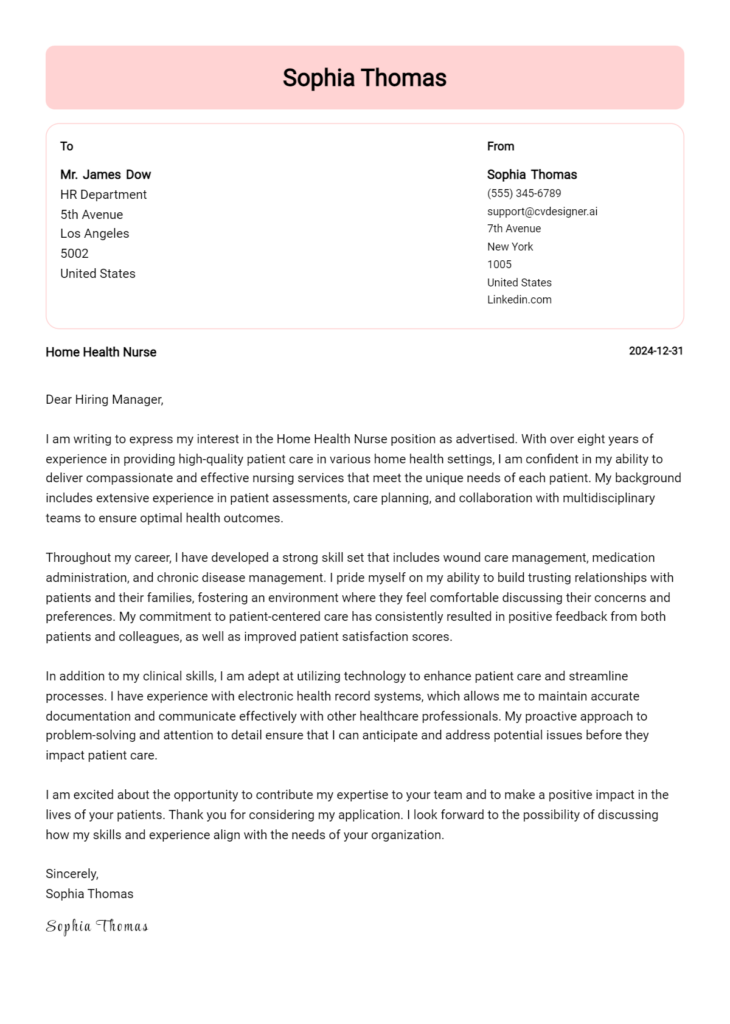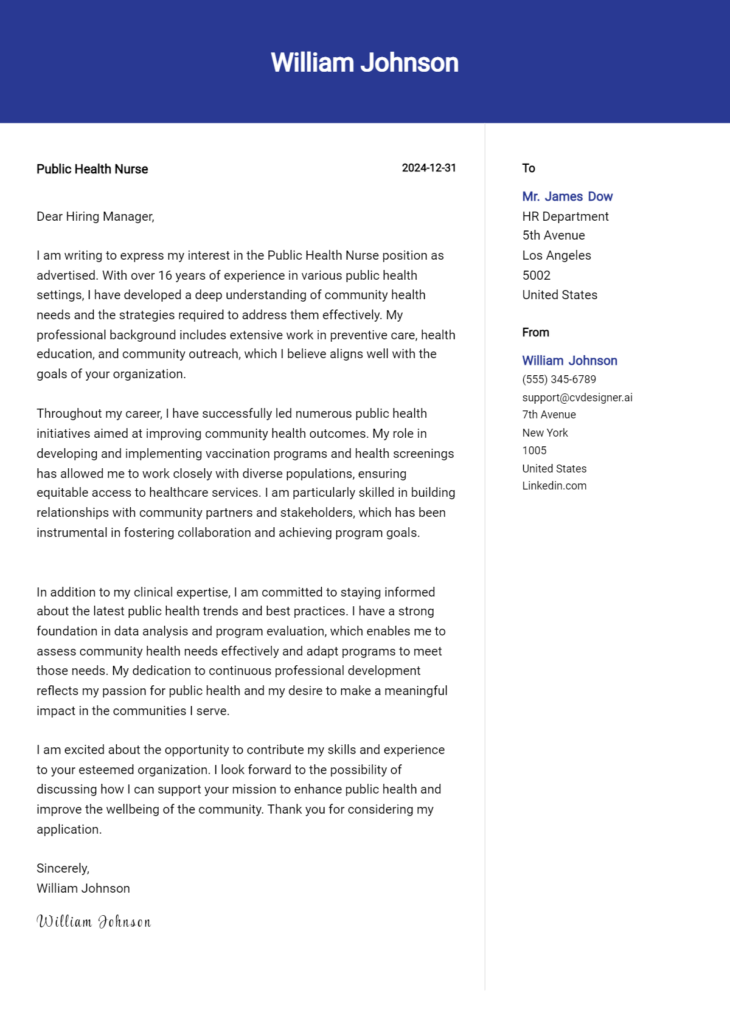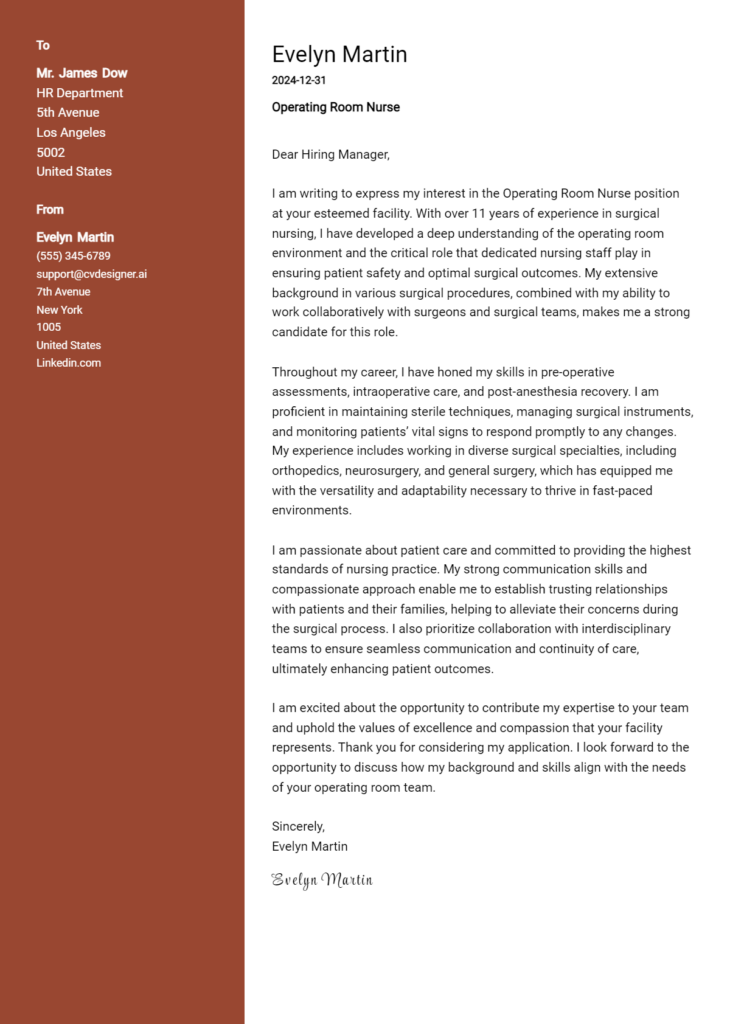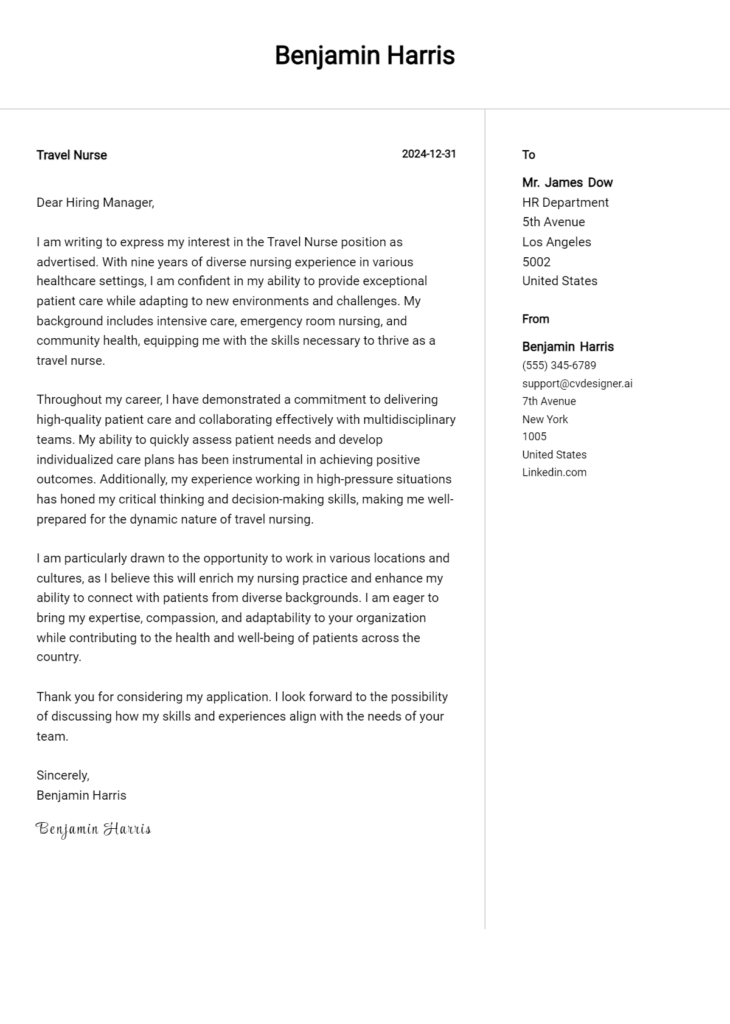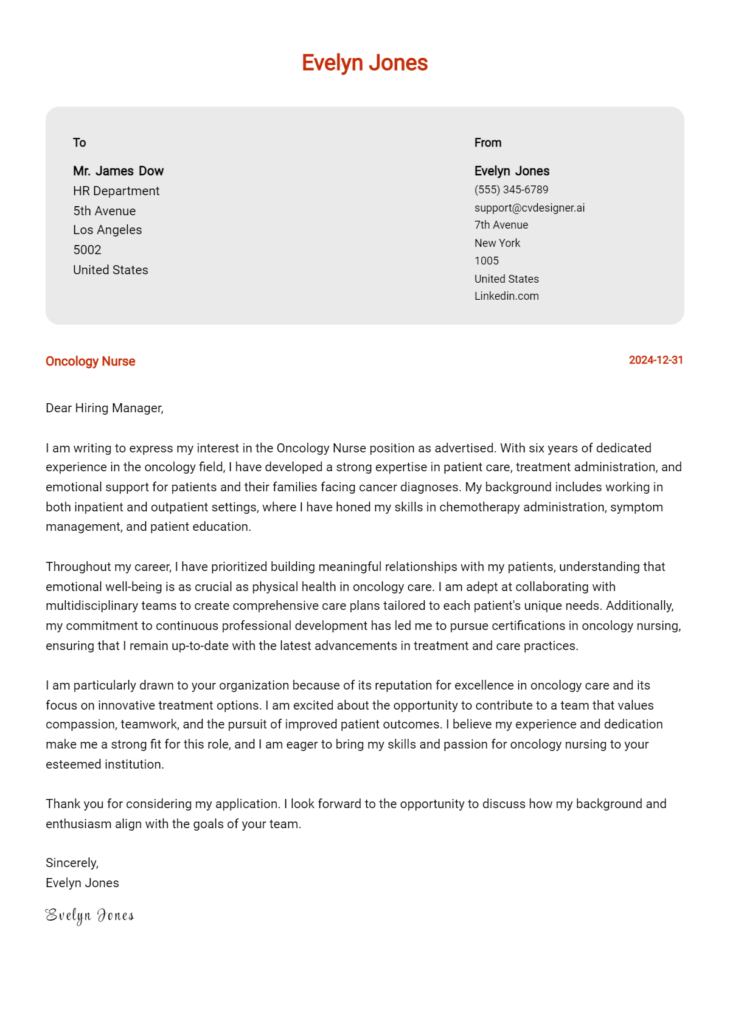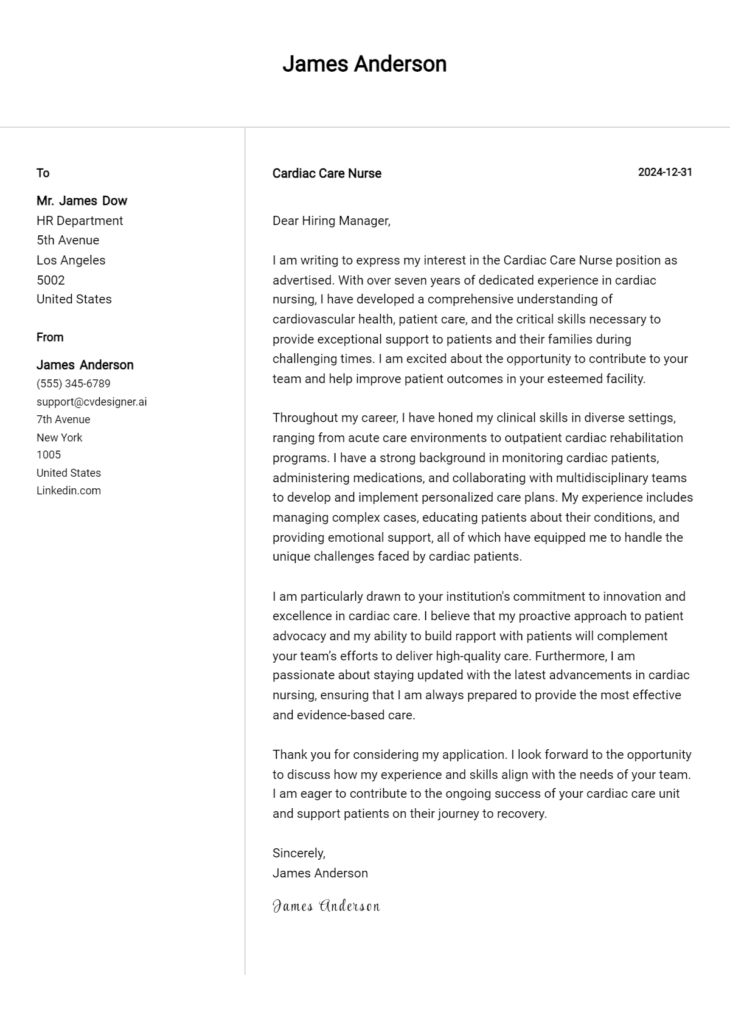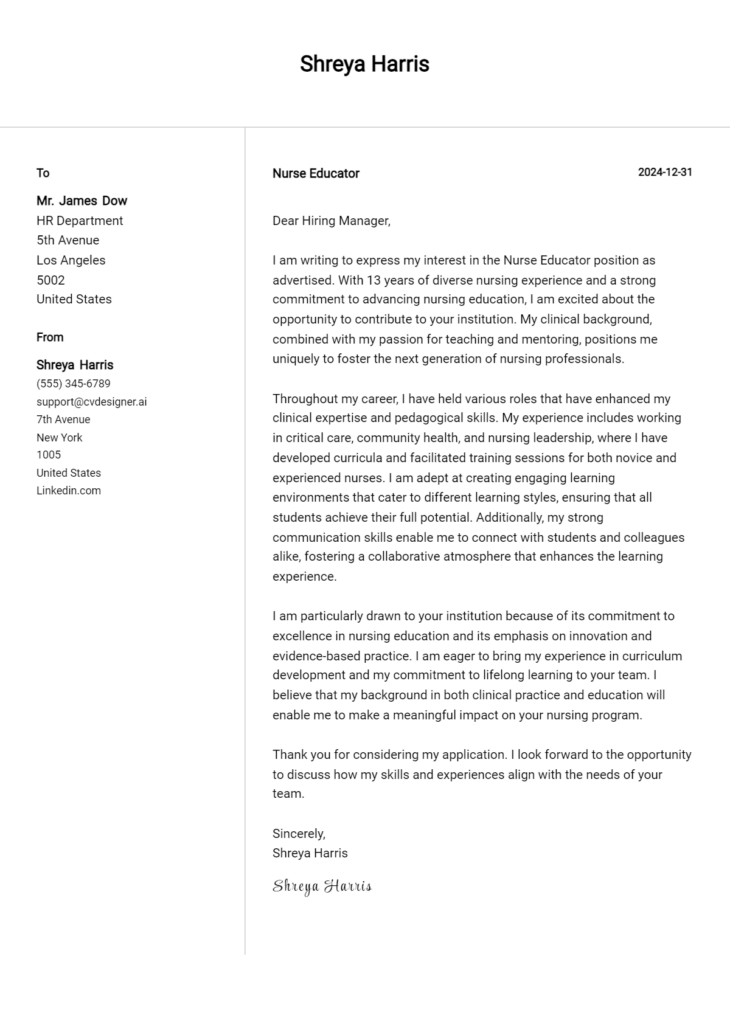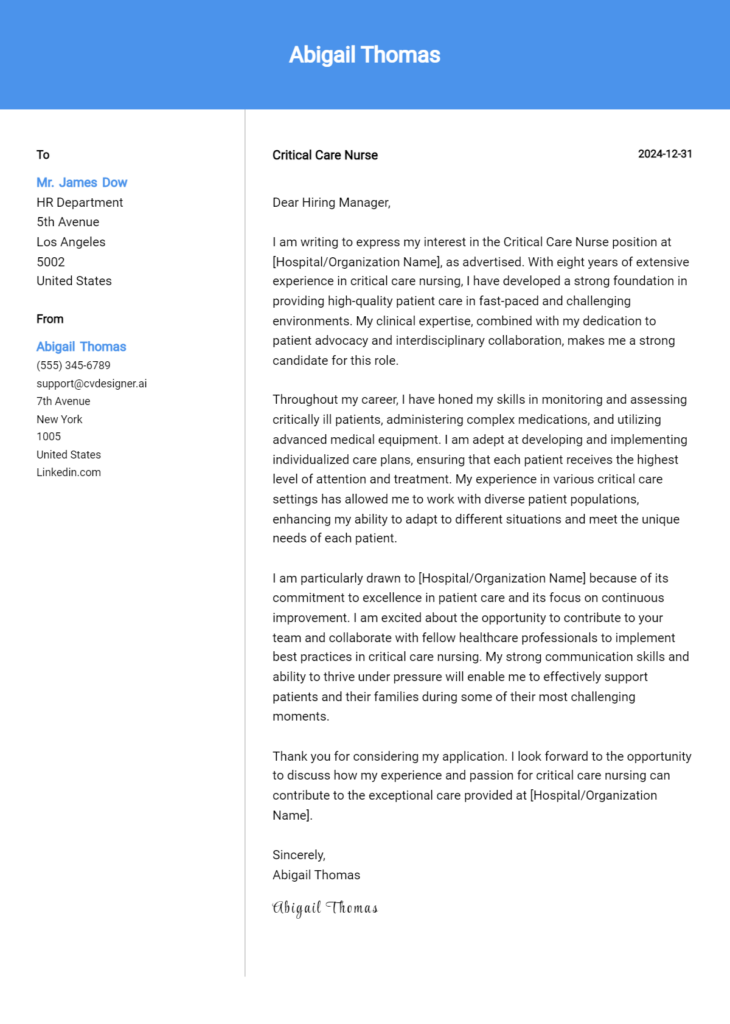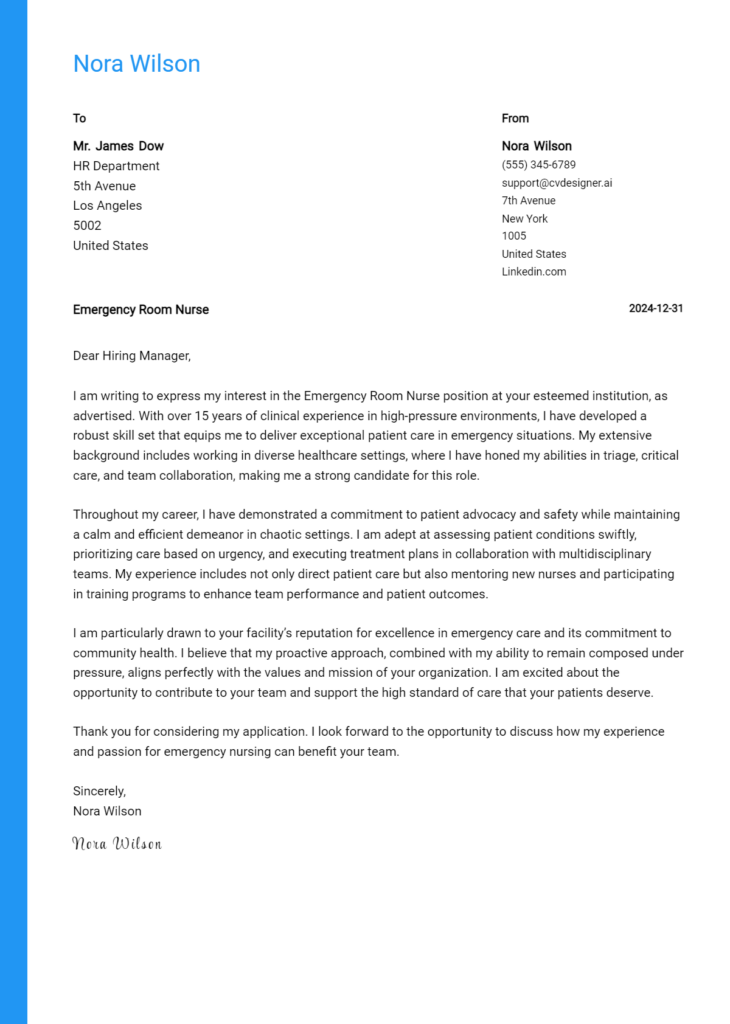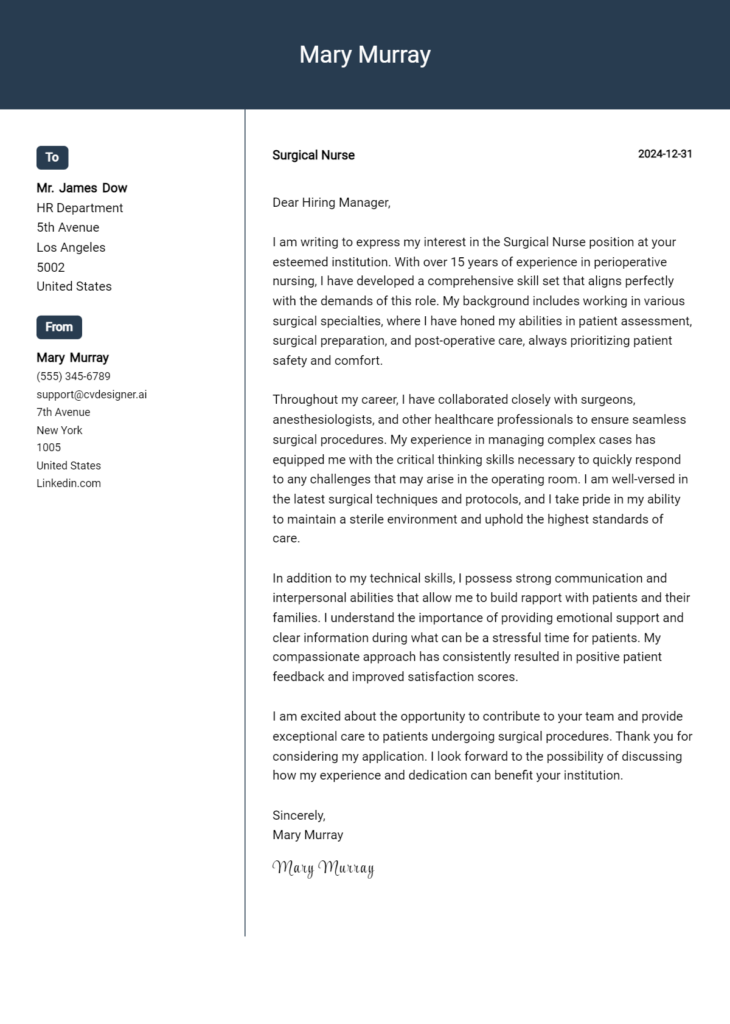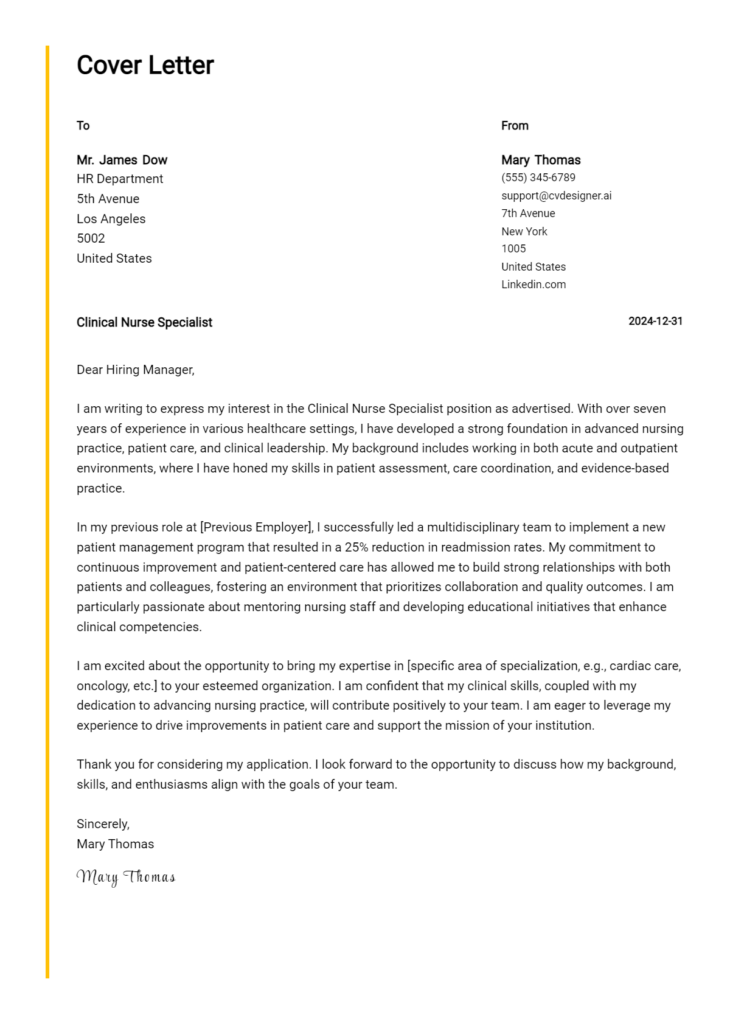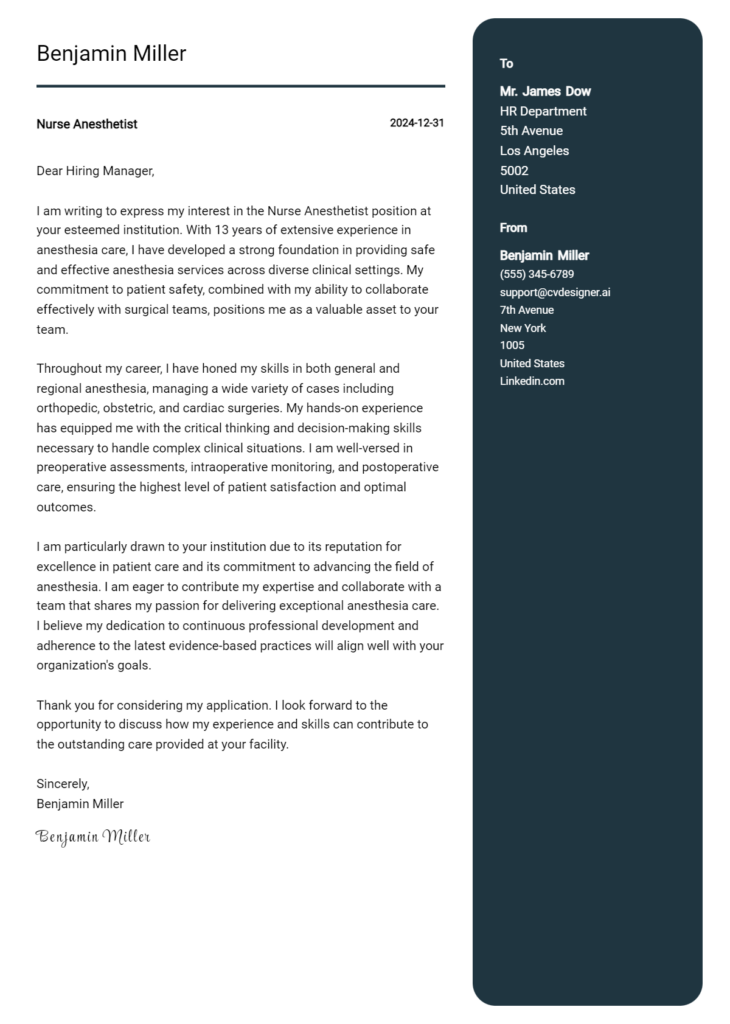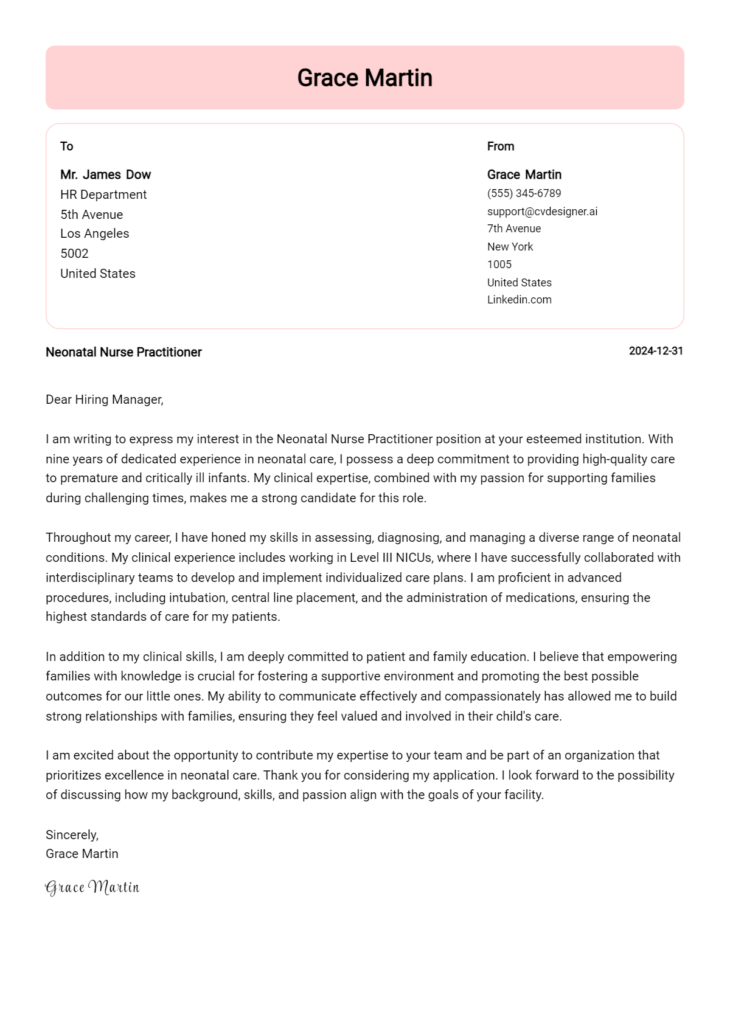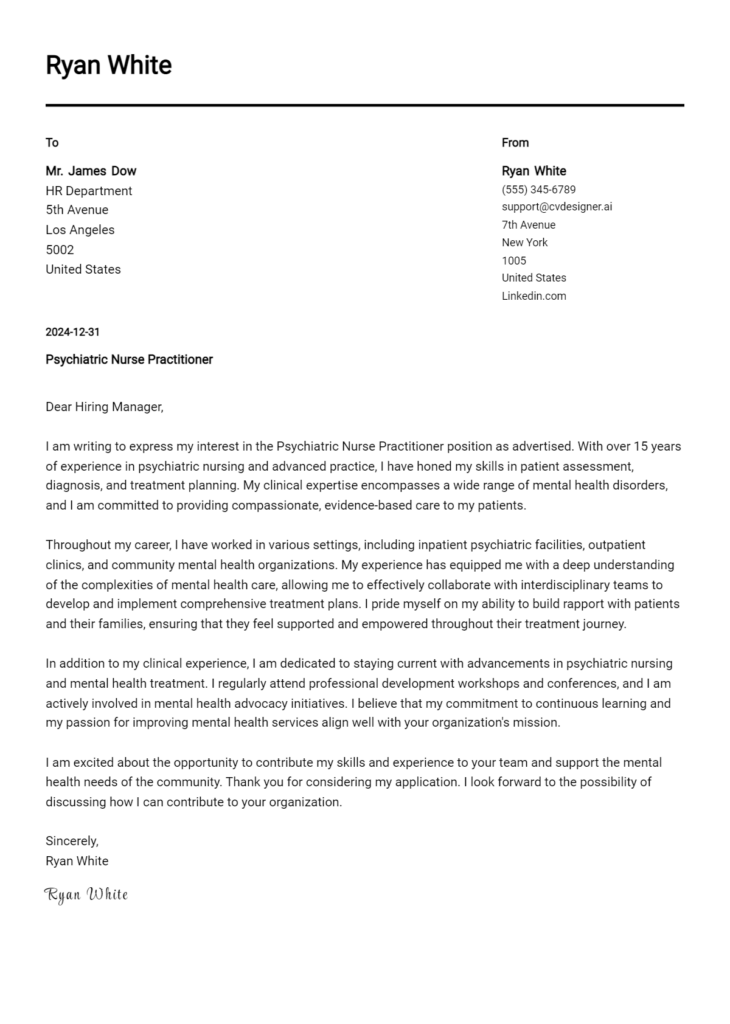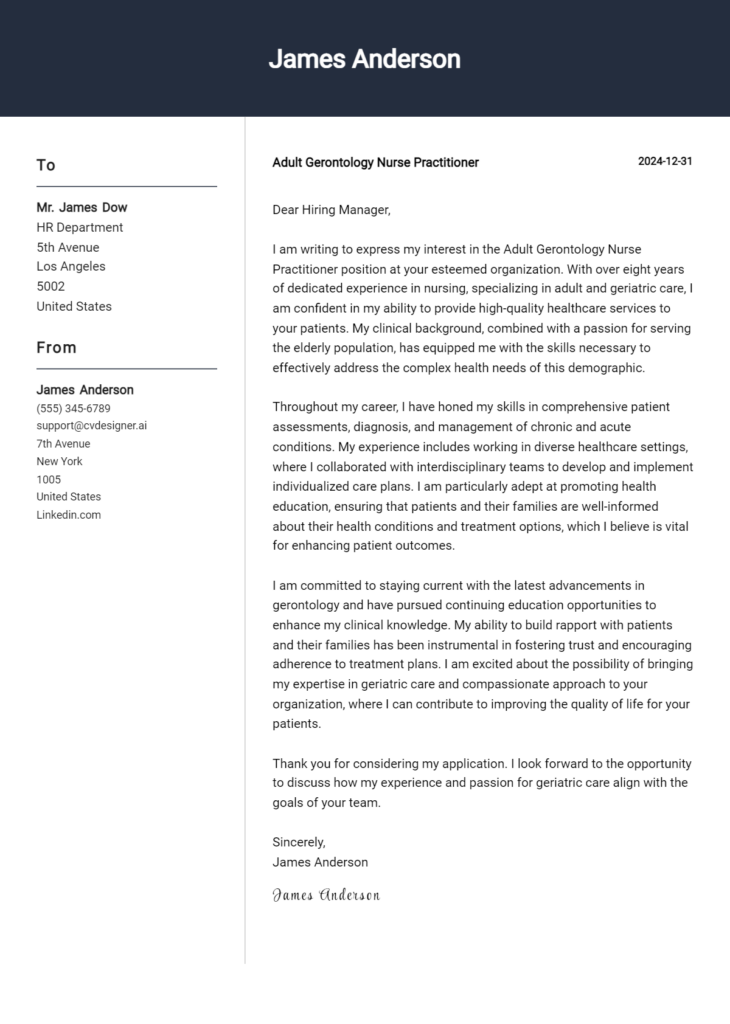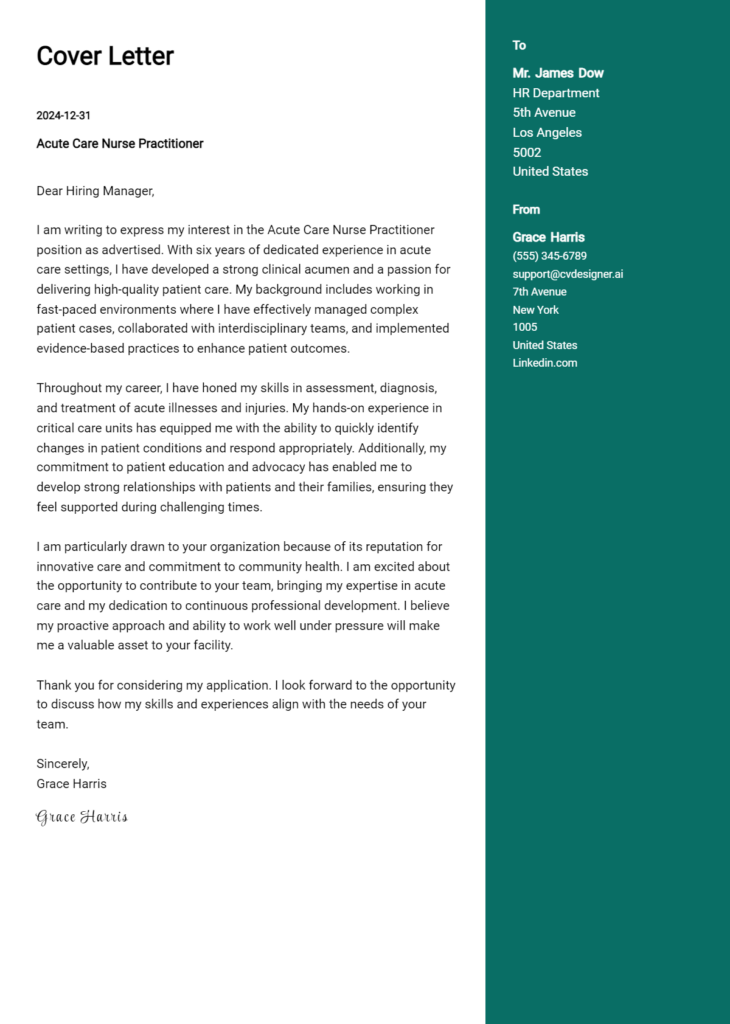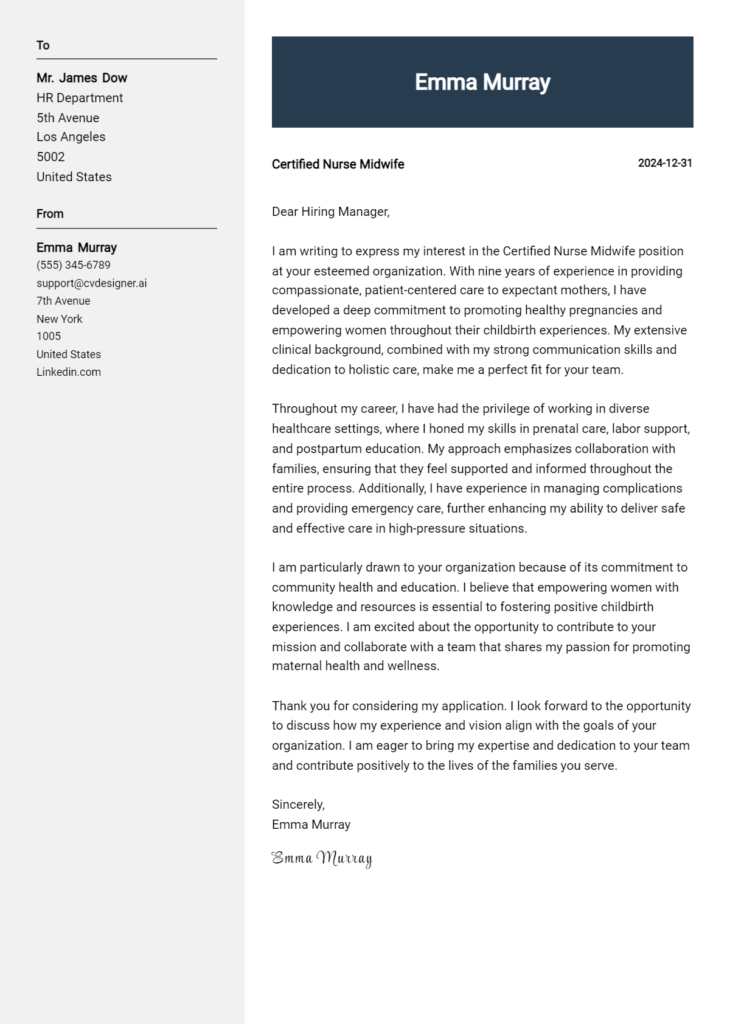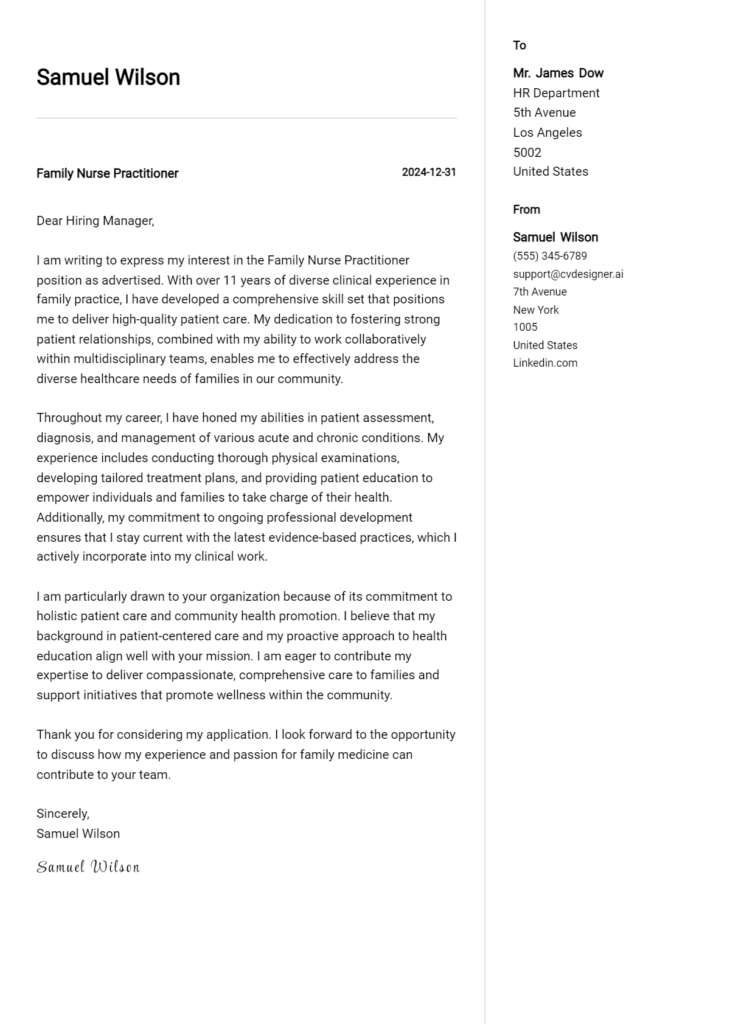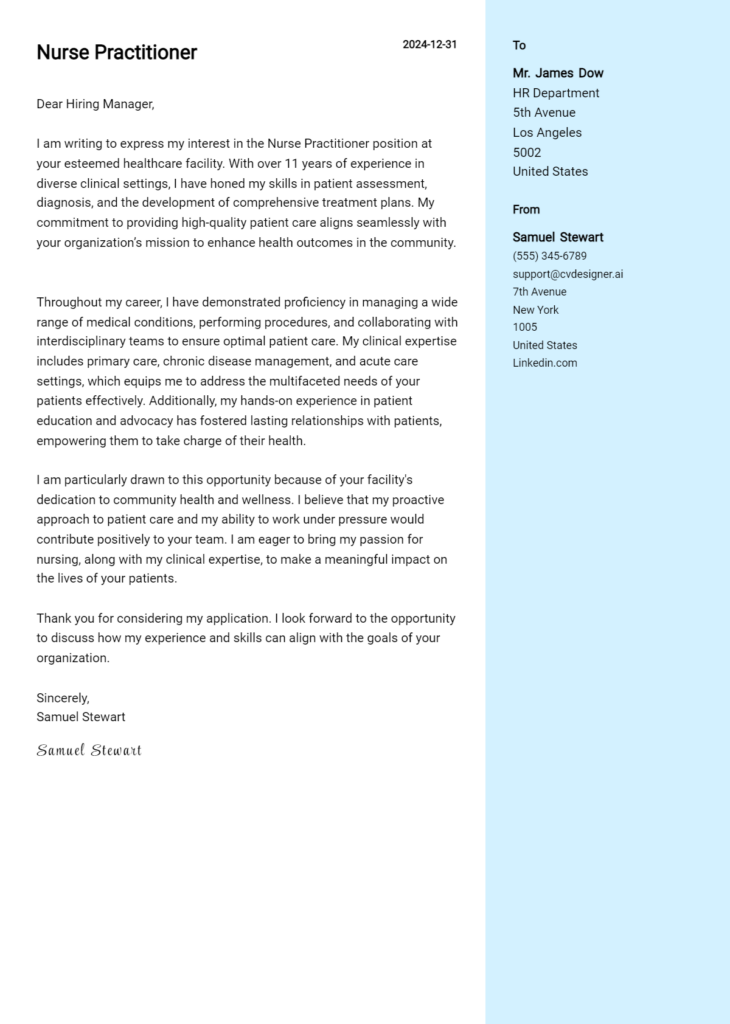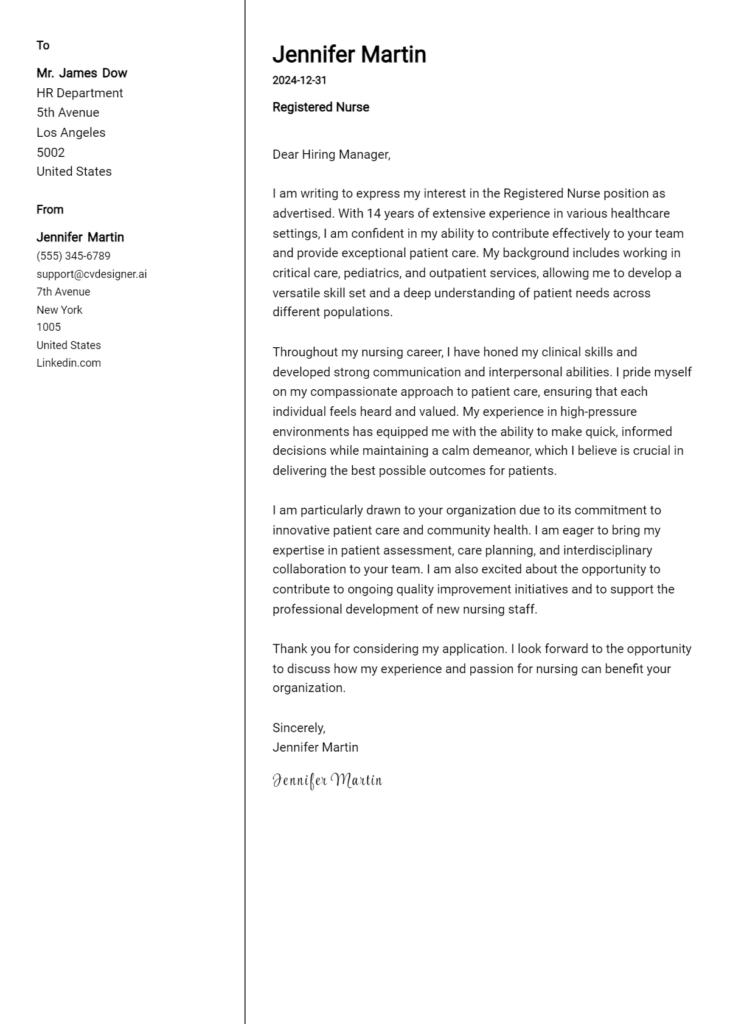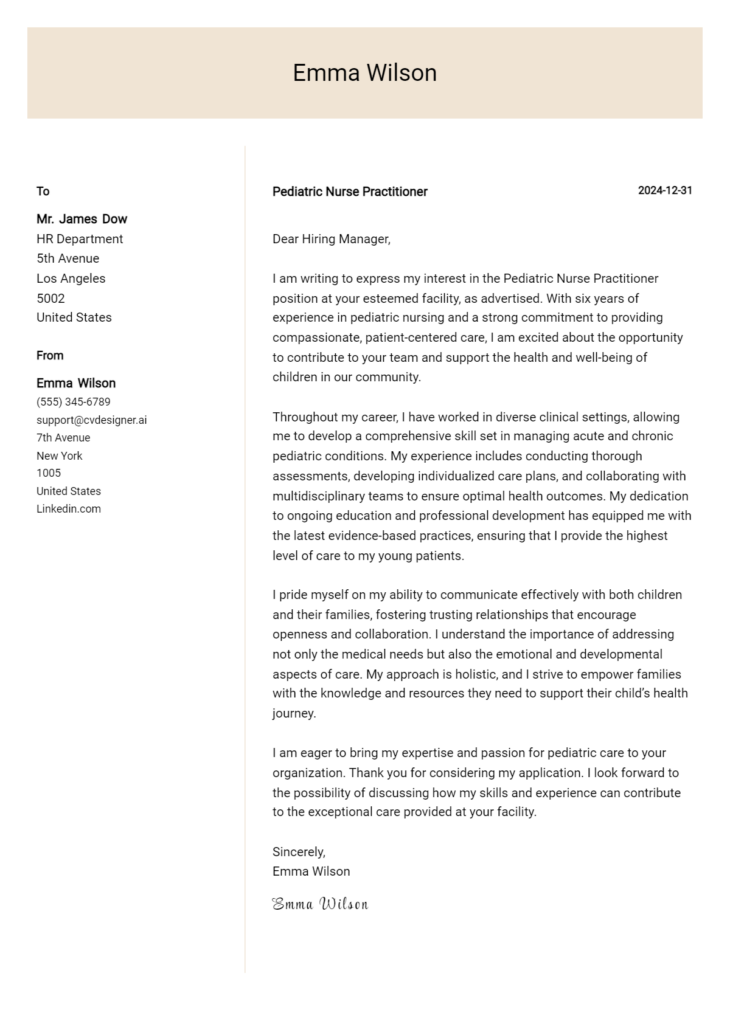Nurse Researcher Cover Letter Examples
Explore additional Nurse Researcher cover letter samples and guides and see what works for your level of experience or role.
How to Format a Nurse Researcher Cover Letter?
Crafting a compelling cover letter is essential for a Nurse Researcher, as it serves as your first opportunity to demonstrate your expertise in clinical research and your passion for advancing healthcare. The way you format your cover letter can significantly influence how hiring managers perceive your professionalism and attention to detail—qualities that are paramount in the nursing research field. A well-structured letter not only highlights your qualifications but also showcases your ability to communicate effectively, an essential skill for research roles.
In this guide, we will outline how to structure your Nurse Researcher cover letter, providing valuable insights and examples tailored specifically for this profession.
We will focus on the essential components of a professional cover letter, including:
- Cover Letter Header
- Cover Letter Greeting
- Cover Letter Introduction
- Cover Letter Body
- Cover Letter Closing
Each section is vital in presenting your qualifications and professionalism. Let’s delve into each part and explore how to make your Nurse Researcher cover letter stand out.
Importance of the Cover Letter Header for a Nurse Researcher
The cover letter header is a crucial element of any professional correspondence, especially for a Nurse Researcher. It sets the tone for the entire document and provides essential information at a glance. A strong header includes your contact information, the date, and the recipient's details, ensuring clarity and professionalism. A well-structured header not only aids in identifying the sender and recipient but also helps in creating a positive impression right from the start.
Here's an example of a strong and a weak cover letter header for a Nurse Researcher:
Strong Example
Jane Doe, RN, PhD 123 Health St, Suite 456 Cityville, ST 12345 jane.doe@email.com (123) 456-7890 October 1, 2023 Dr. John Smith Director of Nursing Research Health Institute 789 Wellness Ave Cityville, ST 12345
Weak Example
Jane 10/1/23 To whom it may concern
The Importance of the Cover Letter Greeting for a Nurse Researcher
The greeting of your cover letter serves as the first impression you make on potential employers and sets the tone for the rest of your application. A well-crafted greeting demonstrates professionalism and a personalized touch by addressing the hiring manager directly. This personal approach not only shows respect but also indicates that you have taken the time to research the organization and its staff, which can set you apart from other candidates.
To ensure your greeting stands out, avoid generic phrases like "To Whom It May Concern." Instead, make an effort to find out the name of the hiring manager or recruiter. If necessary, visit the organization’s website, check LinkedIn, or call the office to inquire. A specific greeting reflects your initiative and genuine interest in the position.
Strong Greeting Example
Dear Dr. Jane Smith,
Weak Greeting Example
To Whom It May Concern,
Importance of a Well-Crafted Cover Letter Introduction for a Nurse Researcher
A well-crafted cover letter introduction is crucial for a Nurse Researcher as it serves as the first impression to the hiring manager. An engaging introduction should capture their attention, express genuine interest in the role, and succinctly highlight key skills or achievements relevant to the position. This sets the tone for the rest of the cover letter and can significantly impact the chances of landing an interview. Here are examples of both strong and weak cover letter introductions for a Nurse Researcher role:
Strong Example
Dear [Hiring Manager's Name], As a passionate and dedicated Nurse Researcher with over five years of experience in clinical trials and patient-centered research, I am excited to apply for the Nurse Researcher position at [Institution Name]. My proven track record in designing and implementing innovative research studies, coupled with my commitment to improving patient outcomes, aligns perfectly with your team’s mission to advance healthcare solutions. I am eager to contribute my expertise in statistical analysis and evidence-based practice to drive impactful research initiatives at your esteemed institution.
Weak Example
To Whom It May Concern, I am writing to apply for the Nurse Researcher position. I have worked in nursing for a while and think it would be a good job. I have done some research and have a few relevant skills, but I am not sure how they align with what you are looking for.
Cover Letter Body for Nurse Researcher
The body of a cover letter for a Nurse Researcher plays a crucial role in showcasing the candidate’s unique skills, relevant experiences, and the value they can bring to a healthcare organization. It serves as a platform to highlight specific research projects, clinical trials, or nursing practices that the candidate has been involved in, demonstrating their expertise in evidence-based practice and their ability to contribute to advancing healthcare knowledge. By detailing significant accomplishments, such as published research, successful grant applications, or innovative patient care strategies, the candidate can effectively communicate their qualifications and enthusiasm for the role, making a compelling case for their candidacy.
Strong Example
I am particularly proud of my recent project focused on improving patient outcomes in post-operative care through a randomized controlled trial. This study not only yielded statistically significant results in reducing infection rates by 30% but also led to the implementation of new protocols that are now standard practice in our unit. Additionally, I successfully secured a $50,000 grant to fund this research, further demonstrating my commitment to advancing nursing science and improving patient care. My collaborative approach and strong analytical skills make me a valuable asset to your research team, particularly in developing innovative solutions that address current healthcare challenges.
Weak Example
I have worked as a Nurse Researcher for several years. I have done some projects and have a few skills that might help your organization. I think my experience could be beneficial, but I don’t have specific details to share at this moment. I am looking forward to discussing my qualifications with you.
Importance of the Cover Letter Closing for a Nurse Researcher
The closing paragraph of a cover letter is crucial as it serves to summarize your qualifications, reiterate your enthusiasm for the position, and encourage the hiring manager to take the next steps, such as reviewing your resume or scheduling an interview. A strong closing can leave a lasting impression and reinforce your suitability for the role, while a weak closing may fail to convey your genuine interest or undermine your overall message.
Strong Example
Thank you for considering my application for the Nurse Researcher position at [Company Name]. With my extensive background in clinical research, coupled with my passion for advancing patient care through evidence-based practices, I am excited about the opportunity to contribute to your team. I look forward to the possibility of discussing how my skills and experiences align with the goals of your organization. Please feel free to contact me to schedule an interview or if you need any additional information. Thank you once again for your time and consideration.
Weak Example
I hope you like my application. I have some experience in research and think I could do the job. If you want to talk, that would be fine. I guess you can look at my resume if you want. Thanks for reading this.
These tips will assist candidates in crafting an effective cover letter for a Nurse Researcher position. A well-written cover letter not only highlights your relevant experiences but also showcases essential technical skills, problem-solving abilities, knowledge of the Software Development Life Cycle (SDLC), teamwork, and a commitment to continuous learning. Here are five detailed tips to help you stand out in your application.
Tips for Writing an Effective Cover Letter for Nurse Researcher
Highlight Technical Skills: Clearly outline your technical skills related to nursing research, such as proficiency in statistical software (e.g., SPSS, SAS), familiarity with electronic health records (EHR), and experience with data analysis. Use specific examples to demonstrate how these skills have contributed to previous projects or research studies.
Showcase Problem-Solving Abilities: Discuss instances where you successfully identified a problem and implemented a solution in your research work. Whether it involved addressing patient care challenges or optimizing research processes, illustrating your problem-solving capabilities can set you apart as a candidate who can think critically and act decisively.
Demonstrate Knowledge of SDLC: If applicable, mention your understanding of the Software Development Life Cycle, especially if your research involves clinical informatics or health technology. Explain how your knowledge of SDLC has informed your project management skills and improved research outcomes, thereby showcasing your ability to bridge nursing and technology.
Emphasize Teamwork and Collaboration: Nurse researchers often work within multidisciplinary teams. Share examples of successful collaborations with other healthcare professionals, researchers, or stakeholders. Highlight your communication skills and ability to contribute effectively to team goals, which will demonstrate your readiness to work in a collaborative research environment.
Express Passion for Continuous Learning: As a Nurse Researcher, staying updated on the latest research methodologies and healthcare innovations is vital. Convey your enthusiasm for lifelong learning by mentioning any additional certifications, workshops, or courses you have pursued. This not only reflects your commitment to professional development but also positions you as a proactive contributor to the research community.
By incorporating these tips into your cover letter, you can create a compelling narrative that showcases your qualifications and passion for the field. For further guidance, consider exploring cover letter templates or use a cover letter builder to streamline the writing process.
Common Mistakes to Avoid in a Nurse Researcher Cover Letter
Crafting a compelling cover letter is essential for standing out in the competitive field of nurse research. Avoiding common pitfalls can significantly enhance your chances of making a positive impression. Here are some frequent mistakes to be mindful of, along with tips for avoiding them:
Generic Greeting: Using "To Whom It May Concern" can make your letter feel impersonal. Always try to address the letter to a specific individual. Research the hiring manager’s name if possible.
Lack of Tailoring: Sending the same cover letter to multiple employers can be detrimental. Tailor your letter to the specific job by highlighting relevant experience and skills that align with the job description.
Overly Complex Language: While professionalism is important, using overly complicated language can hinder clarity. Aim for a balance between professionalism and straightforward communication.
Neglecting to Showcase Achievements: Many applicants fail to highlight their accomplishments. Use specific examples of your past research and its impact to demonstrate your qualifications effectively.
Ignoring Formatting Guidelines: A poorly formatted cover letter can detract from your message. Adhere to a standard cover letter format to maintain professionalism. For guidance, check out our cover letter format.
Excessive Length: Keep your cover letter concise; ideally, it should be no longer than one page. Focus on the most relevant information to capture the reader's attention.
Failure to Proofread: Spelling and grammatical errors can undermine your professionalism. Always proofread your letter multiple times or enlist a colleague to review it before submission.
By steering clear of these mistakes and focusing on delivering a well-structured, compelling cover letter, you can significantly improve your chances of landing an interview. For further inspiration, check out some cover letter examples.
Cover Letter FAQs for Nurse Researcher
What should I include in my cover letter as a Nurse Researcher?
In your cover letter, you should include your educational background, relevant research experience, and any specialized skills related to nursing and research methodologies. Highlight your understanding of both clinical and research settings, emphasizing your ability to bridge the gap between patient care and scientific inquiry. Be sure to mention specific projects or studies you have been involved in, showcasing your contributions and results. Additionally, if applicable, include any publications or presentations that demonstrate your expertise. Tailor your letter to the job description, illustrating how your qualifications align with the organization's goals.
How do I tailor my cover letter for a specific Nurse Researcher position?
To tailor your cover letter effectively, start by closely reading the job description to identify key skills and qualifications the employer is seeking. Match your experiences and accomplishments to those requirements, using specific examples that demonstrate your capabilities. Incorporate relevant keywords from the job listing to show that you understand the role. Additionally, research the organization’s current projects and areas of focus, and express your enthusiasm for contributing to their research initiatives. Personalizing your cover letter not only shows your interest in the position but also your commitment to the organization’s mission.
How can I demonstrate my research skills in my cover letter?
Demonstrate your research skills by providing concrete examples of previous research projects you have worked on. Describe your role in these projects, including any specific methodologies you employed and the outcomes achieved. Mention any statistical software or research databases you are proficient in, as well as your experience with data collection and analysis. If you have authored or co-authored research papers, include this information to highlight your ability to communicate findings effectively. Additionally, discuss any collaborations with interdisciplinary teams and how these experiences have enhanced your research capabilities.
Should I include my nursing credentials in my cover letter?
Yes, including your nursing credentials in your cover letter is essential, as they establish your professional qualifications and credibility. Start by mentioning your nursing degree and any relevant certifications, such as a Nurse Practitioner (NP) or Clinical Nurse Specialist (CNS). If you hold advanced degrees, such as a Master's or Doctorate in Nursing or a related field, be sure to highlight these as well. Your credentials not only demonstrate your expertise in nursing but also underscore your commitment to evidence-based practice, which is crucial for a Nurse Researcher. This information helps to create a comprehensive picture of your professional background and suitability for the role.
Build your Cover Letter in minutes
Use an AI-powered cover letter builder and have your letter done in 5 minutes. Just select your template and our software will guide you through the process.

